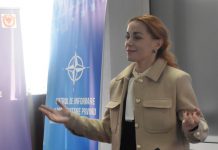Moldovan President Vladimir Voronin’s signature on the March 18 Moscow declaration, with Russian President Dmitry Medvedev and Transnistria’s leader Igor Smirnov (Interfax, Russian MFA website, March 18, 19; see EDM, March 20, 25), amounts to a surrender in the final days of Voronin’s presidency. This political document has solidified Russia’s military presence and increased Russia’s scope for influencing Moldova’s policy choices through manipulation of the Transnistria conflict. These are the short-term effects and may extend beyond the short term unless a post-Voronin government disavows this move.
In signing that declaration and committing to a follow-up, Russian-driven process of negotiations, Voronin has abandoned bedrock negotiating positions that he had himself developed or embraced from 2004 onward. He was still standing by those positions as recently as late February 2009 in statements for domestic audiences and even for the Russian media (see EDM, March 2).
Voronin’s signature practically revokes Moldova’s longstanding demand for a prompt, complete, and unconditional withdrawal of Russian troops and their replacement by an international civilian observer mission. Moldova had most recently reaffirmed that demand at the OSCE’s 2008 year-end meeting in Helsinki in December 2008 (on Voronin’s personal authorization as was regularly the case since 2004). Voronin, moreover, pledged many times, down to January and February 2009 that he would hold to the letter of Moldova’s July 2005 organic law in his negotiations with Russia on the Transnistria conflict. This law, which Voronin had himself presented at that time for the parliament’s adoption, stipulates that Russian troops must withdraw prior to the signing of a political solution to the Transnistria conflict (as distinct from signing a political solution in the shadow of Russian troops).
Under the Moscow declaration, however, Voronin has accepted an open-ended presence of Russian troops, pending a political solution to the Transnistria conflict, which Russia can continue stonewalling as it has done all along. Voronin’s acceptance can also be easily misconstrued to imply Moldovan host-country consent for the stationing of Russian troops, "temporarily" for an indefinite period. This undermines Moldova’s defense of its sovereignty by recourse to the Treaty on Conventional Forces in Europe (CFE) and the 1999 Istanbul Commitments. Under those documents, no country may station its troops on another’s territory without the latter country’s consent. In Moldova’s case, moreover, that same Istanbul package requires Russia to withdraw its troops fully and without conditions. Voronin’s signature on the Moscow declaration, however, will enable Russia–and certain Western governments that take the Kremlin at its word–to argue that Moldova has renounced those positions and accepted the presence of Russian troops.
This change can help Russia persuade Western countries to ratify the 1999-adapted, as yet unratified CFE treaty. The stationing of Russian troops in Moldova had become the main obstacle to Russian-desired ratification of that treaty by the countries of the Euro-Atlantic community. Meanwhile, Germany and some other governments within NATO were arguing for ratification despite Russian breaches in Moldova and Georgia. The Germans were even proposing to reinterpret the 1999 documents so as to exempt Russian "peacekeeping" troops from the requirement to withdraw. The declaration just signed by Voronin with Medvedev can further strengthen Russian and German arguments along those lines.
Voronin has further undercut the European Union and the U.S. position on the Transnistria conflict by signing the Moscow declaration. Brussels and Washington are aiming for withdrawal of Russian troops within the political settlement package. Admittedly, this approach bows to the Russian-imposed principle of "synchronizing" political settlement with military withdrawal. It also contravenes the 1999 Istanbul agreements, which had removed any such "synchronization." But the March 18 Moscow declaration marks a further, big step backward by replacing the goal of troop withdrawal with the goal of merely re-flagging the existing "peacekeeping" operation and by postponing even that change until after a hypothetical political settlement.
For the first time since 2001, Voronin has now accepted Russia’s treatment of Moldova and Transnistria as co-equal parties. Voronin had tried to approach Tiraspol as a co-equal during the first months of his presidency in 2001. Ever since that shattered attempt, Chisinau has tried hard to circumvent Tiraspol, negotiating or (more recently) "consulting" directly with Moscow, in the hope that the latter would ultimately broker a settlement compatible with Moldova’s territorial integrity. The Kremlin, however, never delivered; and Voronin has now yielded his long-held position, sinking back onto the same footing with Tiraspol vis-a-vis Moscow. By the same token Moldova’s negotiating position known as the "Package," prepared in autumn 2006 by Voronin’s negotiators Marc Tcaciuc and Vasile Sova with Western blessing, and strongly supported by the president ever since, has now been swept off the table.
The Medvedev-Voronin-Smirnov declaration torpedoes what had been commonly held Moldovan and Western negotiating positions. It also poses the risk that the 2+1 negotiating format (Moldova, Transnistria, Russia, with Russia in full control) would supplant the international 5+2 format (Russia, Ukraine, OSCE, United States, European Union, Chisinau, Tiraspol). That risk would become especially acute if decisions adopted in the 2+1 format are then simply referred to the 5+2 format, so as to confront the Western side with a fait accompli.






